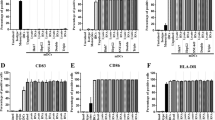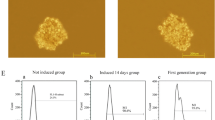Abstract
Cholangiocarcinoma (CCA) is a cancer of the bile ducts that is associated with poor prognosis and poor treatment outcome. Approximately one-third of CCA patients can undergo surgery, but the recurrence rate is high and chemotherapy often cannot satisfactorily prolong survival. Cellular immunotherapy based on adoptive T-cell transfer is a potential treatment for CCA; however, the development of this technology and the search for an appropriate tumor-associated antigen are still ongoing. To enhance the cytotoxic activity of effector T cells against CCA, we developed self-differentiated monocyte-derived dendritic cells (SD-DC) presenting cAMP-dependent protein kinase type I-alpha regulatory subunit (PRKAR1A), which is an overexpressed protein that plays a role in the regulation of tumor growth to activate T cells for CCA cell killing. Dendritic cells (DCs) transduced with lentivirus harboring tri-cistronic cDNA sequences (SD-DC-PR) could produce granulocyte–macrophage colony-stimulating factor, interleukin-4, and PRKAR1A. SD-DC showed similar phenotypes to those of DCs derived by conventional method. Autologous effector T cells (CD3+, CD8+) activated by SD-DC-PR exhibited greater cytotoxic activity against CCA than those activated by conventionally-derived DCs. Effector T cells activated by SD-DC-PR killed 60% of CCA cells at an effector-to-target ratio of 15:1, which is approximately twofold greater than the cell killing performance of those stimulated with control DC. The cytotoxic activities of effector T cells activated by SD-DC-PR against CCA cells were significantly associated with the expression levels of PRKR1A in CCA cells. This finding that SD-DC-PR effectively stimulated autologous effector T cells to kill CCA cells may help to accelerate the development of novel therapies for treating CCA.






Similar content being viewed by others
Abbreviations
- CCA:
-
Cholangiocarcinoma
- CHX:
-
Cycloheximide
- CTA:
-
Cancer–testis antigens
- DAB:
-
Diaminobenzidine
- FOXM1:
-
Forkhead box M1
- MAGE:
-
Melanoma-associated antigen
- PBMC:
-
Peripheral blood mononuclear cell
- PI:
-
Propidium iodide
- PRKAR1A:
-
cAMP-dependent protein kinase type I-alpha regulatory subunit
- SD-DC:
-
Self-differentiated monocyte-derived dendritic cell
- TAA:
-
Tumor-associated antigen
- TRP2:
-
Tyrosinase-related protein 2
References
Senzolo M, T MS, Rossetto V et al (2012) Prospective evaluation of anticoagulation and transjugular intrahepatic portosystemic shunt for the management of portal vein thrombosis in cirrhosis. Liver Int 32(6):919–927
Blechacz BR, Gores GJ (2008) Cholangiocarcinoma. Clin Liver Dis 12(1):131–150 (ix)
Valle J, Wasan H, Palmer DH et al (2010) Cisplatin plus gemcitabine versus gemcitabine for biliary tract cancer. N Engl J Med 362(14):1273–1281
Koya RC, Kimura T, Ribas A et al (2007) Lentiviral vector-mediated autonomous differentiation of mouse bone marrow cells into immunologically potent dendritic cell vaccines. Mol Ther 15(5):971–980
Pincha M, Sundarasetty BS, Salguero G et al (2012) Identity, potency, in vivo viability, and scaling up production of lentiviral vector-induced dendritic cells for melanoma immunotherapy. Hum Gene Ther Methods 23(1):38–55
Loilome W, Yongvanit P, Wongkham C et al (2006) Altered gene expression in Opisthorchis viverrini-associated cholangiocarcinoma in hamster model. Mol Carcinog 45(5):279–287
Loilome W, Juntana S, Namwat N et al (2011) PRKAR1A is overexpressed and represents a possible therapeutic target in human cholangiocarcinoma. Int J Cancer 129(1):34–44
Bright JJ, Sriram S (1998) TGF-beta inhibits IL-12-induced activation of Jak–STAT pathway in T lymphocytes. J Immunol 161(4):1772–1777
Shimizu K, Kotera Y, Aruga A et al (2012) Clinical utilization of postoperative dendritic cell vaccine plus activated T-cell transfer in patients with intrahepatic cholangiocarcinoma. J Hepatobiliary Pancreat Sci 19(2):171–178
Loilome W, Juntana S, Pinitsoontorn C et al (2012) Suppression of PRKAR1A expression enhances anti-proliferative and apoptotic effects of protein kinase inhibitors and chemotherapeutic drugs on cholangiocarcinoma cells. Asian Pac J Cancer Prev 13(Suppl):143–147
Neefjes J, Jongsma ML, Paul P, Bakke O (2011) Towards a systems understanding of MHC class I and MHC class II antigen presentation. Nat Rev Immunol 11(12):823–836
Patronas Y, Horvath A, Greene E et al (2012) In vitro studies of novel PRKAR1A mutants that extend the predicted RIalpha protein sequence into the 3′-untranslated open reading frame: proteasomal degradation leads to RIalpha haploinsufficiency and Carney complex. J Clin Endocrinol Metab 97(3):E496–E502
Hochnadel I, Kossatz-Boehlert U, Jedicke N et al (2017) Cancer vaccines and immunotherapeutic approaches in hepatobiliary and pancreatic cancers. Hum Vaccines Immunother 13(12):2931–2952
Lizee G, Gonzales MI, Topalian SL (2004) Lentivirus vector-mediated expression of tumor-associated epitopes by human antigen presenting cells. Hum Gene Ther 15(4):393–404
Zarei S, Leuba F, Arrighi JF, Hauser C, Piguet V (2002) Transduction of dendritic cells by antigen-encoding lentiviral vectors permits antigen processing and MHC class I-dependent presentation. J Allergy Clin Immunol 109(6):988–994
Ohta K, Yamashita N, Tajima M et al (1999) Diesel exhaust particulate induces airway hyperresponsiveness in a murine model: essential role of GM-CSF. J Allergy Clin Immunol 104(5):1024–1030
Oliver JA, Stolberg VR, Chensue SW, King PD (2012) IL-4 acts as a potent stimulator of IFN-gamma expression in CD8+ T cells through STAT6-dependent and independent induction of eomesodermin and T-bet. Cytokine 57(1):191–199
Morris SC, Heidorn SM, Herbert DR et al (2009) Endogenously produced IL-4 nonredundantly stimulates CD8+ T cell proliferation. J Immunol 182(3):1429–1438
Loffler MW, Chandran PA, Laske K et al (2016) Personalized peptide vaccine-induced immune response associated with long-term survival of a metastatic cholangiocarcinoma patient. J Hepatol 65(4):849–855
Acknowledgements
The authors gratefully acknowledge Dr. Naravat Poungvarin of the Clinical Molecular Pathology Laboratory, Department of Clinical Pathology, Faculty of Medicine Siriraj Hospital, Mahidol University, Bangkok, Thailand for providing lentivirus vectors. The authors also thank Kevin Jone for editing.
Funding
This work was financially supported by Mahidol University (Grant no. R016010006), the Thailand Research Fund (TRF) (Grant no. IRG5980006), the TRF-International Research Network (TRF-IRN) (Grant no. IRN58W001), and the Newton Fund-Office of Higher Education Commission (OHEC) Institutional Links Grant. Chutamas Thepmalee was supported by a TRF-Royal Golden Jubilee (TRF-RGJ)-Ph.D. Scholarship (Scholarship no. PHD/0044/2556). Nattaporn Phanthaphol was supported by a TRF-IRN Scholarship (Scholarship no. IRN5801PHDW03). Mutita Junking was supported by a TRF Grant for New Researcher (Grant no. TRG5780173) and a Siriraj Chalermprakiat Grant. Pa-thai Yenchitsomanus was supported by a Siriraj Chalermprakiat Grant.
Author information
Authors and Affiliations
Contributions
AP conceived the study, designed and conducted experiments, and drafted and revised the manuscript. CT optimized DC culture protocol and conducted experiments. NS designed and conducted experiments. JS designed and conducted experiments. NP conducted experiments. MJ developed and optimized DC culture protocol, and conducted experiments. SW acquired human CCA tissues, and isolated and cultured CCA cells. PY conceived the study, managed the research team, designed experiments, and edited and revised the manuscript. All authors read and approved the final manuscript.
Corresponding author
Ethics declarations
Conflict of interest
The authors declare that they have no conflicts of interest.
Ethical approval and ethical standards
For the use of human tissues from cancer patients, written informed consent was obtained in accordance with the approval of the Human Research Committee, Khon Kaen University (Approval number: #HE471214). For the use of blood samples from healthy donors, written informed consent was obtained in accordance with the approval of the Siriraj Institutional Review Board (SIRB), Faculty of Medicine Siriraj Hospital, Mahidol University (Approval number: Si 517/2016).
Electronic supplementary material
Below is the link to the electronic supplementary material.
Rights and permissions
About this article
Cite this article
Panya, A., Thepmalee, C., Sawasdee, N. et al. Cytotoxic activity of effector T cells against cholangiocarcinoma is enhanced by self-differentiated monocyte-derived dendritic cells. Cancer Immunol Immunother 67, 1579–1588 (2018). https://doi.org/10.1007/s00262-018-2212-2
Received:
Accepted:
Published:
Issue Date:
DOI: https://doi.org/10.1007/s00262-018-2212-2




